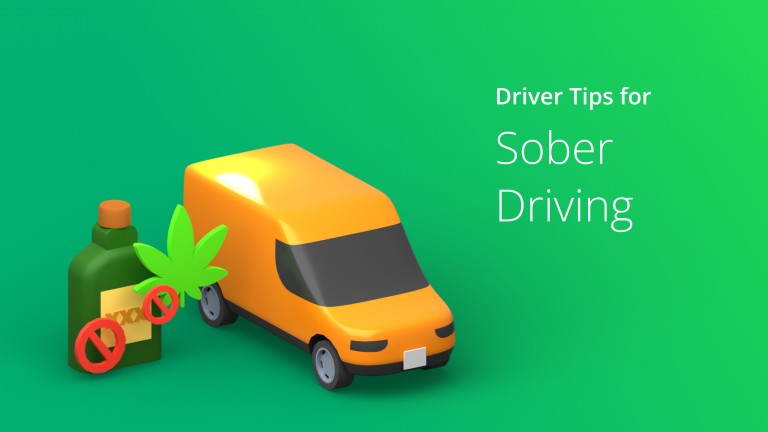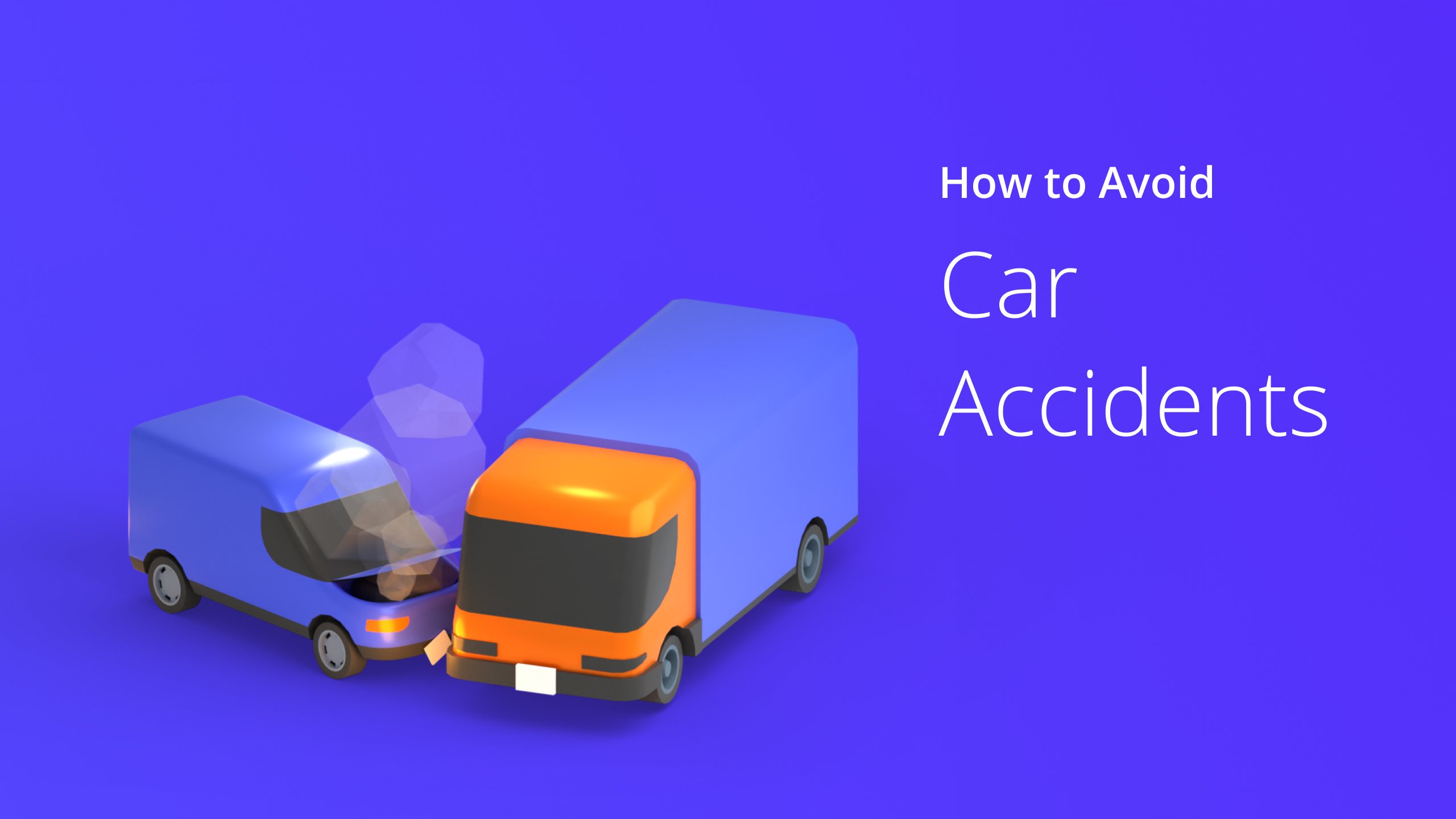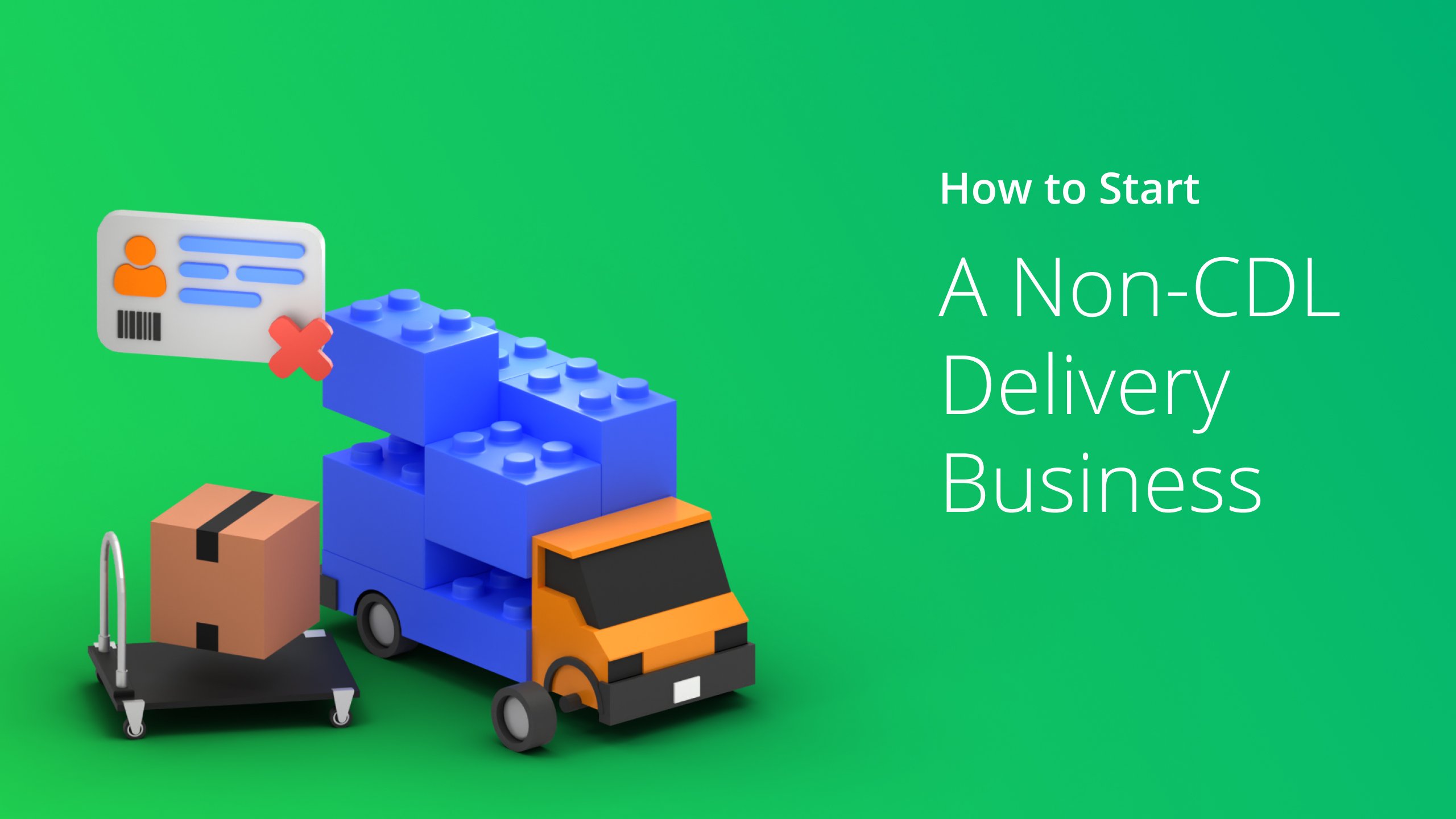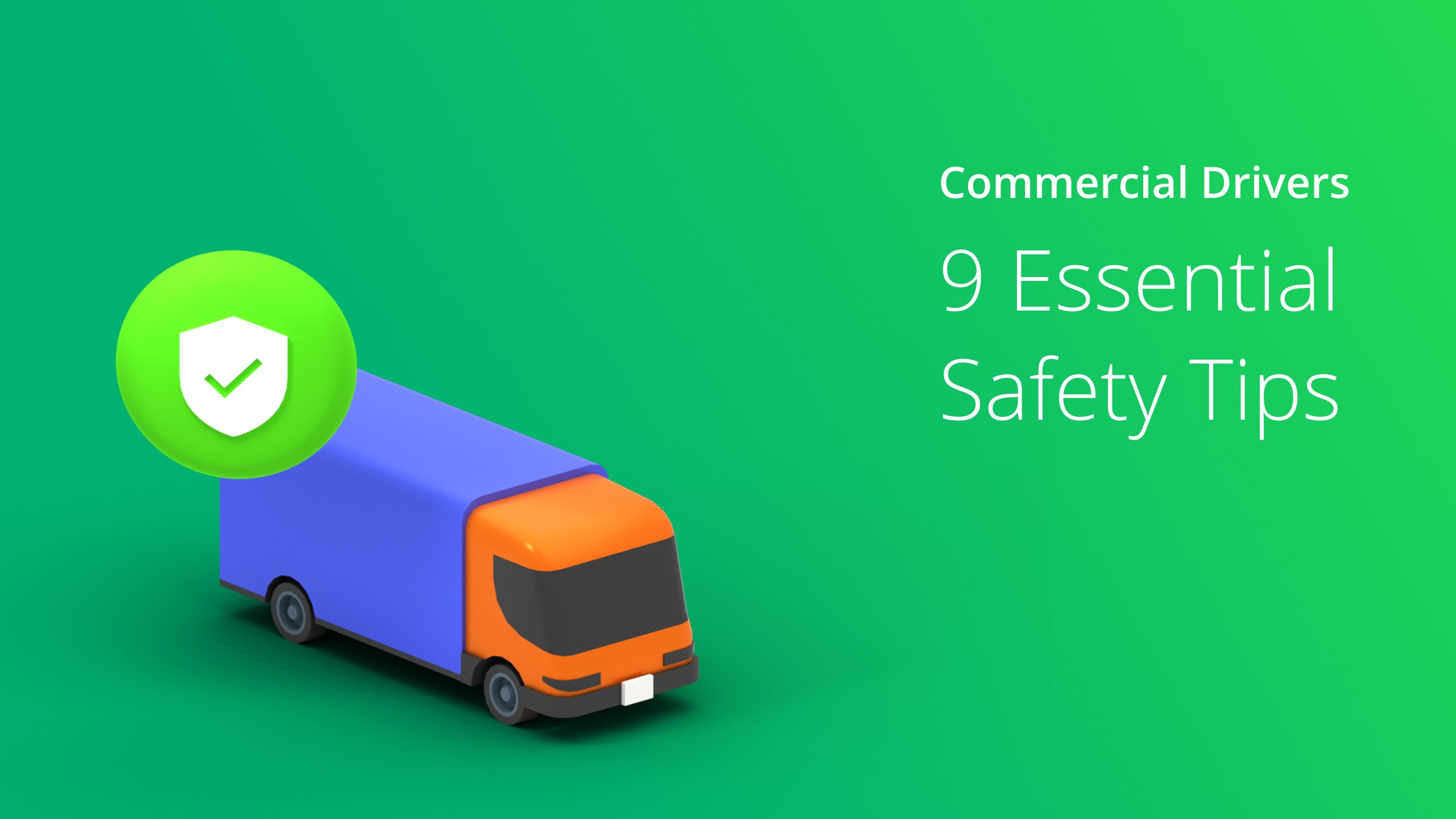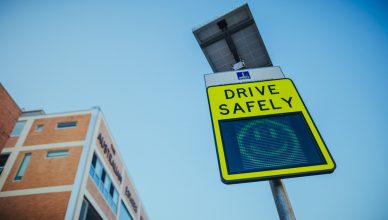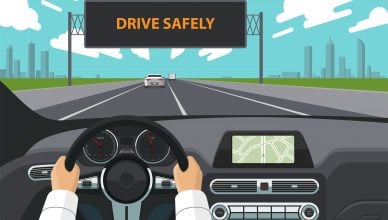We get it—long days, lonely nights, never-ending highways, neverending stops—it can be a grind. But when it comes to relieving stress, drivers should know that turning to substances is not the answer.
Sure, a little beer or wine may seem like the perfect way to take the edge off after a long day on the road. But even just one drink is too much for those who drive for work.
It may come as a surprise that alcohol-related crashes among commercial truckers have increased in recent years. And although large trucks and commercial vehicles still only make up about 3% of all alcohol-related traffic fatalities, the total number increased by 14.3% with changes in every category.
Whether or not you’ve been boozing behind the wheel, this article is here to remind you that your driver job is a privilege, not a right. So don’t risk it—keep your cool and stay sober in the driver’s seat.
Truck Route Navigation App

Table of Contents
Driver Responsibilities
Drivers, and commercial drivers specifically, have to follow both the standard traffic laws that other drivers do and additional, state-specific ones. For example, they must log their breaks accurately, take mandated rest periods after driving for several hours consecutively and adhere to loading restrictions designed to help prevent accidents.
In other words, those who drive as a job have a duty of care to the public that is greater than that of an average driver.
There are a few reasons for this:
- Drivers represent their company by association with their driving, whether they like it or not.
- Driving for work means driving for long periods of time and facing challenges like heavy traffic, bad road conditions, and adverse weather.
- When behind the wheel of a large truck or commercial vehicle, a single mistake can cause catastrophic damage due to the vehicle’s size.
- Driving a large truck is much harder than driving a regular-sized vehicle—commercial truckers have to be extra vigilant due to the size, load requirements, and tight time frames.
Commercial drivers, delivery drivers, and all others who drive for work must adhere to the rules of the road just as any other driver does, but should also be aware that one mistake can have serious consequences on their career and livelihood.
In the case of a CDL, requirements to obtain the license are more stringent than that of other driver’s licenses, and maintaining a clean driving record is essential.
What Is a Commercial DUI?
A commercial DUI is the same as a regular DUI, but it applies to those who are operating a commercial vehicle for business purposes.
In most states, this means having a blood alcohol content (BAC) of .04% or higher. The legal limit for drivers of non-commercial vehicles is generally .08%.
If you’re pulled over and suspected of driving under the influence, you’ll likely be asked to take a field sobriety test and a breathalyzer test or have your blood drawn for an alcohol concentration test.
You will also have to submit to drug testing if you’re suspected of being under the influence of drugs or other substances.
If suspected of being under the influence, you’ll be arrested for a commercial DUI.
Blood Alcohol Limits for Commercial Truck Drivers
The Federal Motor Carrier Safety Administration (FMCSA) has clearly stated that as a trucker, any alcohol concentration in your breath or blood must not exceed 0.04%. That’s lower than the legal limit for regular drivers by half.
For reference, one beer generally raises your BAC by about 0.02%. But if you like to order IPAs, cocktails, or shots—you should be aware that the higher the alcohol content, the more quickly your BAC will rise.
And if your bartender has a heavy pour, one drink could be enough to put you over the federal limit. It’s best practice to avoid drinking altogether if you’re driving a commercial vehicle—no matter what your BAC, you should never mix driving and drinking.
Remember: Any amount of alcohol concentration can lead to a DUI or DWI charge for commercial truckers—and you could end up losing your license or job if convicted.
It Doesn’t Stop at 0.04%
The FMCSA also has other restrictions for licensed commercial drivers to be aware of. If you’ve been using any controlled substances (including marijuana, prescription drugs, and over-the-counter medications), you can also be charged with a DUI or DWI if you are found to be impaired while driving.
Drugs can also impair your driving skills, so it’s important to know the side effects and warnings associated with any medications you take. And if you think you can drive after using marijuana, pills, uppers, or any other substance because your BAC is within the legal limit—think again.
Don’t even drive with swishas in the front seat.
And if you get too turnt up (happens to the best of us), don’t be afraid to take a chill pill (pun intended) and relax instead of driving.
Penalties for Drivers Caught Driving While Intoxicated
Because work vehicles can cause such devastating (and potentially fatal) accidents, federal and state laws punish their drivers more severely than other motorists. If convicted of a traffic violation, a commercial truck driver may also face harsher penalties.
If you surpass the legal limit for your BAC or are found to be impaired while driving, you could face serious ramifications.
If you’re pulled over and you’re above the legal limit (again, 0.04%), you’ll be arrested and charged with a DUI or DWI. And if convicted, you could face the following penalties:
- Fines
- Jail time
- Community service
- DUI school
- License suspension (personal and CDL)
Plus, your insurance rates will skyrocket, and you will have your license revoked.
If a commercial truck driver is caught driving under the influence more than once, they may be subject to much harsher penalties. This can include being permanently barred from ever operating a commercial vehicle again.
If the driver was involved in an accident while intoxicated, they may also face additional criminal charges on top of any civil liability claims brought against them by either the victims or their employer.
State Laws for Drunk Trucking
DUI laws for commercial truck drivers vary from state to state. In most cases, the act of driving a commercial vehicle while under the influence of drugs or alcohol is criminalized just as it would be for those operating passenger vehicles. But this offense may also be listed separately for commercial drivers in some states.
Many states have laws that truckers cannot operate their vehicles while possessing a controlled substance. And if a commercial truck driver refuses to submit to a test measuring blood alcohol content, this could be charged as a separate crime, based on state law.
Employment Ramifications
It should go without saying that you’ll probably lose your job if you get convicted of a DUI/DWI.
You’ll definitely get fired if you drive an 80,000-pound piece of company property while under the influence of drugs or alcohol.
When you’re a commercial truck driver, there’s no room for error. Employers often require their drivers to sign agreements stating that they’ll not drive under the influence or possess any controlled substances. If you violate these terms, you risk losing your job and may not be able to find future employment in the industry.
Even if you’re not convicted, your employer may still decide to terminate or suspend you for breaking their policies on drinking and driving—even if it wasn’t a criminal offense.
Regardless of whether you’re legally convicted or not, it’s not a good look at all.
Tips for Staying Sober Behind the Wheel
Obviously, the best way to avoid getting a DUI or DWI (and losing your job) is not to drink and drive at all.
But if you have been drinking, here are some tips for staying sober behind the wheel:
- Call a cab, Uber, or Lyft
- Don’t wait until you’re already lit to decide not to drive
- Have someone else available to pick you up if necessary
- Take public transportation
- Carry a designated driver card with contact information of a friend or family member
- Utilize your employer’s sober driver programs, if applicable.
A Commercial DUI Crash Is No Accident
An accident happens when someone mistakenly crashes, completely unaware of their blunder. But driving under the influence of drugs or alcohol is no accident—it’s an entirely preventable act that can have serious, life-altering consequences.
A CDL holder who has been trained and vetted for hours and taken rigorous driving tests should know better than to be operating a commercial vehicle while impaired. And to deliberately disregard the law despite this is a careless and reckless act that puts innocent people at risk.
Whether you’re trying to stay awake or take the edge off, don’t risk it.
Improve Driver Safety With Route4Me
Our route optimization software for commercial vehicles won’t take your BAC, but it’ll help you stay safe behind the wheel by allowing your drivers to stay on their routes and minimize distractions.
Route4Me’s specialized features for commercial truckers include:
- Optimized routes that account for driver rest stops, weigh stations, and other truck-specific factors
- Accounting for truck-specific size and weight restrictions (e.g., bridges, tunnels)
- Live vehicle tracking that allows you to monitor your driver’s location in real-time
- Gauging of fuel efficiency so you can reduce costs and maintain a greener fleet
- Safety and road information that keeps drivers informed and up-to-date
And the Route4Me mobile app is so accurate that it can tell whether a driver wobbles, walks in circles, or stops for long periods—all potential indicators that your driver may be impaired.
Whether you’re a driver, fleet manager, or commercial trucking company owner, it’s essential to take the right precautions and utilize the right technology when it comes to staying safe on the road.
With Route4Me’s help, you can ensure that your drivers are following the rules and staying sober behind the wheel.
